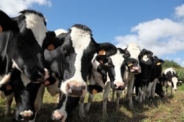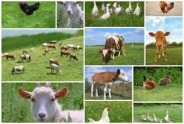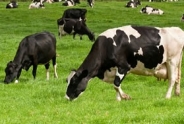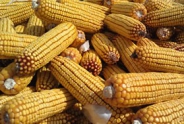Confined Spaces - A Danger Regardless of Farm Size
Jerry Bertoldo, Dairy
Northwest New York Dairy, Livestock & Field Crops
Last Modified: June 25, 2013
A confined space can be defined as an area that has limited openings for entry and exit, has unfavorable natural ventilation which could contain or produce dangerous air contaminants and is not intended for continuous employee occupancy. In the animal agriculture world, upright silos, manure digesters, manure pits, trenches and storage tanks all come to mind as examples.
The danger on the farm is usually in the form of gasses harmful to the respiratory tract, ones that displace oxygen or are explosive in nature. It must be kept I mind that mechanical hazards cannot be ignored. Agriculture is exempt from most OSHA regulations. The mandatory signage, respirators, safety harnesses, eye wash stations and the employee training that goes with it is not mandatory as with other industries.
Silo gas (NO2 or nitrogen dioxide) was a well recognized health danger from the early days of upright silos. The switch to bunkers, bags and bottom unloading silos has reduced the risk. With the increase in collection and storage of liquid manure many more potentially dangerous confined spaces have been created. The key concern is the air within these spaces. This can include a drop in oxygen concentration (from decay of organic matter and displacement by CO2 and/or methane), an increase of carbon dioxide, a buildup of carbon monoxide from nearby running engines, lethal build up of hydrogen sulfide (H2S, rotten egg smell) or explosive levels of methane.
Manure pits have been to blame for numerous deaths of unsuspecting individuals entering them to work on pumps, impellers or other objects needing attention. Low oxygen conditions (16-18% versus the normal 21% atmospheric concentration) as an example are rather innocuous. At these levels there is an impairment of judgment and breathing without the victim realizing it. A drop in the oxygen concentration to 6%, however results in death within minutes. Hydrogen sulfide can be detected by most people at very low levels (<.005 ppm). Between 100-150 ppm the sense of smell is deadened with a few breaths. Levels approaching 350 ppm will cause pulmonary edema and possible death. The heavier than air nature of H2S makes forced ventilation of a pit before entry a must.
Methane (biogas) is non-toxic, lighter than air, colorless and odorless. Even though it does not accumulate in the bottom of a confined space, continuous methane production can be expected from manure at the floor of a pit. At 5-15% concentration by air volume, methane is explosive. This means anything that might create a spark - cell phones, radios, engines, clothing static, fans or any other non-explosion proof devices - could initiate an explosion.
Anyone working around or in confined spaces should be made aware of potential dangers. Working in pairs or groups with a means to retrieve someone quickly from a hazardous air space should be a minimal consideration. For more information go to http://www.ilr.cornell.edu/healthSafety
Upcoming Events
Cornell Cow Convos Podcast- Episode 8 Release
April 25, 2024
Cornell Cow Convos-Episode 8
Western NY Value-Added Dairy Discussion Group: Jess May- Farm Credit East Webinar
May 2, 2024 : Value-Added Dairy Discussion Group Webinar: Jess May- Farm Credit East
Western NY Value-Added Dairy Discussion Group: Eden Valley Creamery
May 3, 2024
South Dayton, NY
Announcements
Follow us on Instagram
See photos and reels of our most recent events and programs!Join us on Facebook!
Follow us on Facebook to get up to date posts about events, workshops and everything NWNY!Add us on LinkedIn!
Connect with us on LinkedIn to get more information about upcoming workshops and programs!





